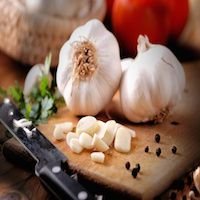Article
Aged Garlic Extract: Slows CV Risk Factors
Author(s):
Previous studies have revealed Aged Garlic Extract (AGE) retards multiple cardiovascular risk factors, including blood pressure, cholesterol, platelet aggregation, and adhesion, while triggering nitric oxide generation within endothelial cells.

Previous studies have revealed Aged Garlic Extract (AGE) retards multiple cardiovascular risk factors, including blood pressure, cholesterol, platelet aggregation, and adhesion, while triggering nitric oxide generation within endothelial cells.
Christoph Hom, MD will share findings surrounding the efficacy of AGE on Coronary Artery Calcification Progression and Blood Pressure Sunday, March 15 at The American College of Cardiology meeting.
Hom and his team conducted 4 placebo-controlled, double-blind, randomized studies during a one-year period to determine AGE’s capability to inhibit vascular calcification and affect blood pressure compared with placebo.
A total of 210 patients were enrolled, of whom 161 were randomized to receive either AGE 1,000 mg or the equivalent amount of placebo to complete the study protocol.
According to Hom, the team used 2-sample median tests to compare medians of CAC progression and the reduction of absolute blood pressure between both garlic & placebo treated groups.
Additionally, the researchers ensured all participants received blood pressure checks twice within the 12 months — at baseline and at the end of the study.
The study results found the median CAC progression was significantly lower in the AGE group (10.8, 95% 0.0-30.7, n = 106) than in the placebo group (18.3, 95% 3.1-34.0, n= 103; p= 0.0385).
Researchers also noted no significant difference between individual cholesterol parameters or C Reactive Protein levels between the groups. However, the mean change in diastolic blood pressure (DBP) for the AGE group (n = 65) was -6.7 (-15.4-2) over 1 year. And they found an average DBP decrease of -3.0 (-11.7-5.7) in the placebo group (n = 103), significantly less than the treated cohort (P = 0.038).
The study proved the initial hypothesis AGE’s ability to successfully decrease DPB and inhibit the rate of progression of CAC, as compared to placebo.
As such, Hom concluded, “Garlic may prove useful for patients who are at high risk of future cardiovascular events.”




